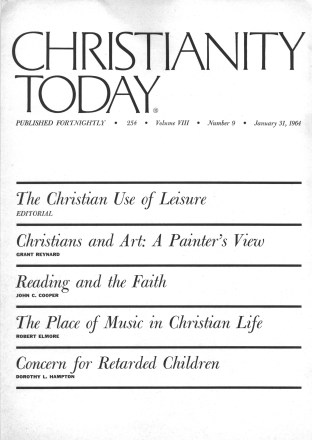Is smoking a moral issue as well as a health problem?
The most conclusive indictment of cigarette smoking issued in America to date—the report to the Surgeon General—produced some carefully worded statements on both sides of this question. (See also the editorial on page 22.)
The 387-page report links cigarette smoking directly to lung cancer and chronic bronchitis and indicates a probable relation to coronary artery disease.
The president of the United Church of Christ, Dr. Ben Mohr Herbster, said flatly that cigarette smoking is not a moral issue but that tobacco advertising aimed at youth is.
On the other side, an Episcopal professor of moral theology, Dr. Thomas J. Bigham, referred to the “moral obligation for the reasonable care of one’s body.”
In some cases, reaction appeared to be colored by personal habits. One prominent minister said frankly that he was a smoker and had no statement to make. Another church spokesman said that the top men in his denomination “smoke like smokestacks” and did not like to make statements on the subject.
The Methodist Church has a no-smoking statement for ministers, and evangelist Billy Graham told Religious News Service that “it will not be a good Christian witness for a clergyman to smoke cigarettes.”
The smoking issue, touchy enough as it is, has been further complicated for a few churches by the fact that they have held stock in the tobacco industry.
RNS reported that the North Carolina Methodist Conference voted to sell its tobacco stock in 1956, but that the General Assembly of the Presbyterian Church in the U. S. (Southern) decided not to dispose of its holdings.
Here are statements made to CHRISTIANITY TODAY by representatives of major denominations:
Dr. Herbster: “Cigarette smoking is not a moral issue. It is a health problem and should be treated as such. Obviously anyone who has studied the Surgeon General’s report and continues to smoke is deliberately jeopardizing his own welfare, but it is his right to do so.… On the other hand [he] knows that he may also be injuring people who are dependent on him and love him. A Christian should find in this fact motivation to quit smoking.
“There is a moral issue to be faced in the advertising that is deliberately designed to make smoking attractive to young people.…”
Dr. Bigham: “… Every Christian should give thorough consideration [to the report and its conclusions] … in the light of Christian conviction of stewardship of the body and the moral obligation for reasonable care of one’s health.”
Dr. Edwin H. Tuller, general secretary of the American Baptist Convention: “… The churches have even a greater responsibility than ever to inform their people of the facts and to discourage smoking, especially among young people.”
Dr. Foy Valentine, secretary of the Christian Life Commission of the Southern Baptist Convention: “… Immediate and positive action is strongly indicated. Let Christian citizens unite behind a legislative program which will protect the young from being victimized through false or misleading advertising of cigarettes, which will rehabilitate those farmers and businessmen who now need a new and less hazardous means of livelihood, and which will provide … a favorable climate where our bodies can indeed be ‘temples of the Holy Spirit.’ ”
Dr. Carl F. Reuss, director of the Commission on Research and Social Action of the American Lutheran Church: “Lutherans have been taught to believe that … ‘deliver us from evil’ includes evil of body and soul, property and reputation. If heavy smoking of cigarettes is as suicidal as the report indicates, whoever prays the Lord’s Prayer ought to heed its implications.…”
Barton Hunter, executive secretary of the Department of Christian Action of the United Christian Missionary Society of the Disciples of Christ: “… We are exceedingly grateful for the report.… [It] raises a question concerning the justifiability of the immense and expensive advertising program … to enlist new users of cigarettes. We shall look forward to publicizing … the findings of the committee and to supporting its efforts in discouraging the use of cigarettes.”
Dr. William H. McCorkle, moderator of the General Assembly of the Presbyterian Church in the U. S.: “I think it would be foolish for individuals not to heed the warning involved. It is not so much a matter of morals as of physical well-being, but there is a moral implication in the possible injuries to our bodies as ‘temples of the Holy Spirit.’ ”
Methodist Bishop John Wesley Lord: “… I earnestly implore the parents of our nation to protect their children from the ghastly results of the smoking habit.…”
G. Elson Ruff, in an editorial in The Lutheran, official organ of the Lutheran Church in America: “We’d better act as vigorously as we can according to the knowledge that tobacco is an enemy, not a friend. But it’s a free country, and those who insist on living dangerously still have that right.”
Breaking The Habit
Since the publication of the smoking report, telephones at the New York headquarters of the Seventh-day Adventist Church’s how-to-stop-smoking program have been “ringing off the hook,” says director Elmon Folkenberg. The five-day series of lectures and films started on the same day that the smoking report appeared in newspapers, and although the city was blanketed by snow, a record 1,200 people came for the first session (the previous high was 700). Another 1,300 people who had signed up for the course were weather-bound. Folkenberg said that there are tentative plans to start another class in New York soon to handle the response.
Adventists will cooperate with New York City’s Department of Health, which asked for assistance in future programs. Other classes are scheduled for Portland, Oregon; New Orleans; and Toronto. Previous classes have been held in Detroit, Minneapolis, Denver, and Hollywood.
The program (which is not used to preach Seventh-day Adventism) has proved its effectiveness. By the end of a five-day course, an average of 50 to 70 per cent of those attending have stopped smoking, according to Marvin Reeder, associate secretary of the Adventists’ Public Relations Bureau in Washington. The percentage drops afterward, but the number of those who continue to “choose not to smoke” (outright vows are discouraged at the beginning) is still high, according to available data.
The “Five Day Plan to Stop Smoking,” as it is called, begins with a film entitled One in 20,000, which shows an actual lung operation and is frankly designed as a shocker, Reeder said. The classes are in the hands of a minister and a doctor. “We are prescribing for the people,” Reeder declared, “and you just can’t prescribe without a physician.”
The nightly seminars are supplemented by a rigorous daily routine that takes each student through the day, from the minute that he wakes up in the morning until he goes to bed. This includes walks, cold showers, rubdowns, and, for the first twenty-four hours, a fruit-juice and no-coffee diet. “A cup of coffee will trigger the impulse to smoke,” Reeder explained.
On the fifth day, a class member can exchange his pipe or old pack of cigarettes for a small pack of cards giving further helpful hints on how to “stay stopped.” Further informal meetings after the series are designed to help those in the course to “hold the ground they’ve gained.”
The Five-Day Plan was started about three years ago by two Seventh-day Adventists, Dr. Wayne McFarland and Pastor Folkenberg. Since then the program has grown to such an extent that now 250 “teams” are putting on sessions around the country. This includes a training program for new instructors.
The Adventists are revamping their follow-up program, because, as Reeder stated, “We feel that if there is a weakness in the program, this is it.” They want to reduce the number of those who turn in their cigarettes and later choose to change their minds. An independent research organization is studying the results of the classes.
The program is growing, and Reeder said they hope to be able to keep up with the demand. As Pastor Folkenberg put it, the recent response has been “phenomenal.”
GEORGE WILLIAMS










